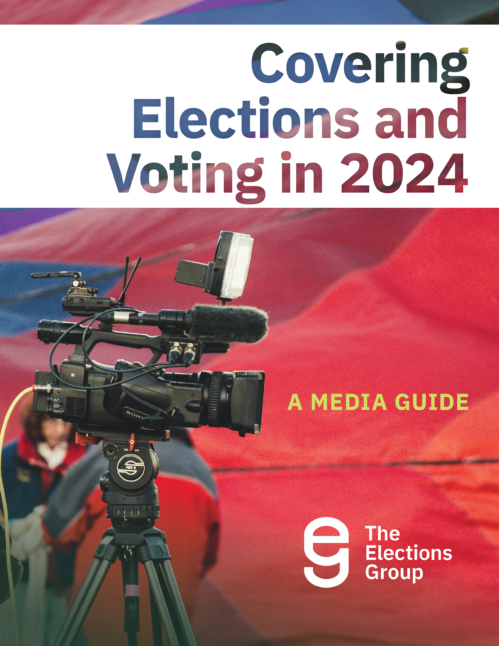April 2, 2024
Covering Elections and Voting in 2024: 3 Things Every Reporter Should Know
Download the Full Guide
Below is an excerpt from Pam Fessler’s Covering Elections and Voting in 2024: A Media Guide, which can be downloaded above or by clicking here.
Elections are run differently in every state, and sometimes in every county within a state.
The rules and laws governing how elections are run differ widely. What’s illegal in one state or county might be allowed, even encouraged, in another. One place might provide 30 days of early voting; another has none at all. Some states accept mail-in ballots that arrive after Election Day, as long as they’re postmarked by then. Other states have strict Election Day deadlines. Some states require a government-issued photo ID; others do not.
To further complicate matters, the laws frequently change and can be overturned by a court at the last minute. Keeping track of it all is challenging, but extremely important. Confusion over the rules makes voters vulnerable to disinformation.
The fastest way to find the latest election requirements for your area is to go to the official state or local election website. Almost every election office has one. Also, numerous nonpartisan organizations, such as the National Conference of State Legislatures, the U.S. Election Assistance Commission and Ballotpedia, list each state’s voting laws and rules on their websites.
Elections are run by people. They’re not perfect.
Almost every election, a voter will cast their ballot with no problem and the ballot is counted accurately. But this is a complicated, human endeavor and there will always be some mistakes, mix-ups and snags.
Most problems are the result of an unintentional human or mechanical error that is detected and easily fixed. Sometimes, the problem is difficult to fix and can have an impact on voting. On rare occasions, it might involve fraud. Your challenge is to distinguish which it is.
Is it human error or an illegal effort to change the outcome of an election? Will it have a critical or minimal impact on voting? What, if anything, are election officials doing to fix the problem?
You might also need to disentangle legitimate concerns from those raised purely for political gain.
In today’s environment, partisan groups are certain to exploit any problem or anomaly as evidence that the election is “rigged” or “unfair.” This has led many voters to throw up their hands and conclude that the system is a mess and cannot be trusted. Explaining what is actually going on and why is the most important thing you can do.
There are many experts and resources available to help you.
The good news about covering elections and voting is that you should have no trouble finding sources. Election officials work in more than 10,000 jurisdictions across the country. They know how the process works in their area and the challenges they face. Most want to help you get that information to the public.
Each state also has a chief election official — usually a secretary of state or state election director — who oversees voting. These officials belong to national, nonpartisan organizations that provide additional expertise and support, such as the National Association of State Election Directors or the National Association of Secretaries of State.
There are also several federal agencies involved in elections, such as the U.S. Election Assistance Commission and the Department of Homeland Security’s Cybersecurity and Infrastructure Security Agency (CISA). Almost all of these can be useful sources.
Outside of government, many academics and nonprofit groups study how elections work. Numerous other parties involved in voting can provide perspectives and valuable information. They include voting equipment vendors, political parties, campaigns, legal organizations, advocacy groups and former election officials.
And don’t forget voters. In 2020, more than 150,000,000 voters cast ballots – all possible sources to share their experiences and opinions.
The bottom line is this beat overflows with information. You just need to know what questions to ask and whom to trust. We provide links to some of the best sources at the end of this guide.
